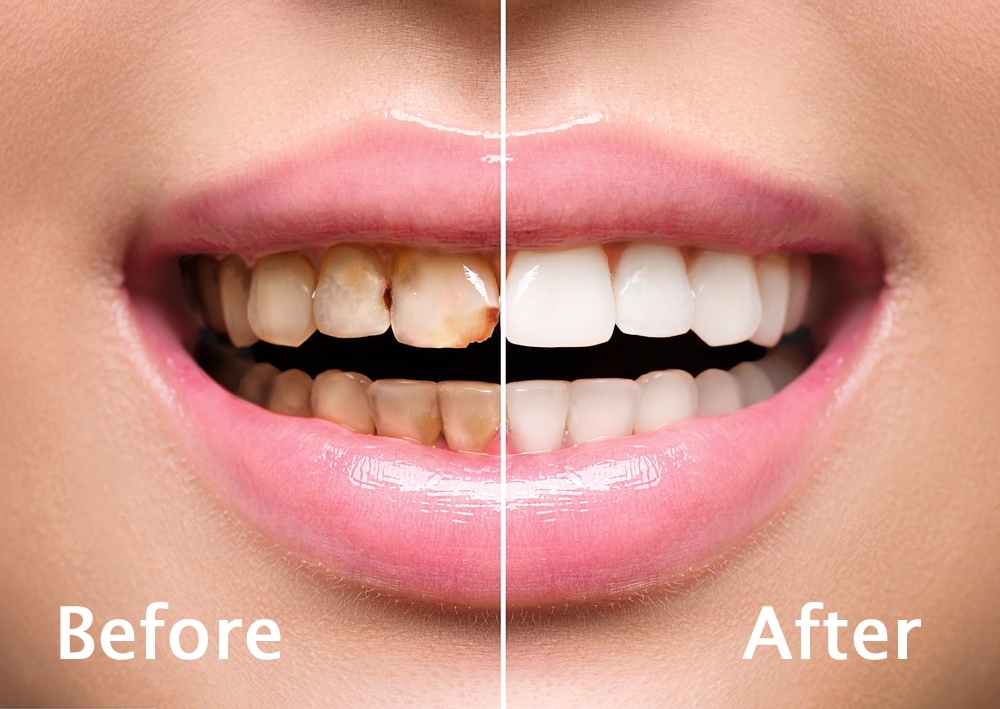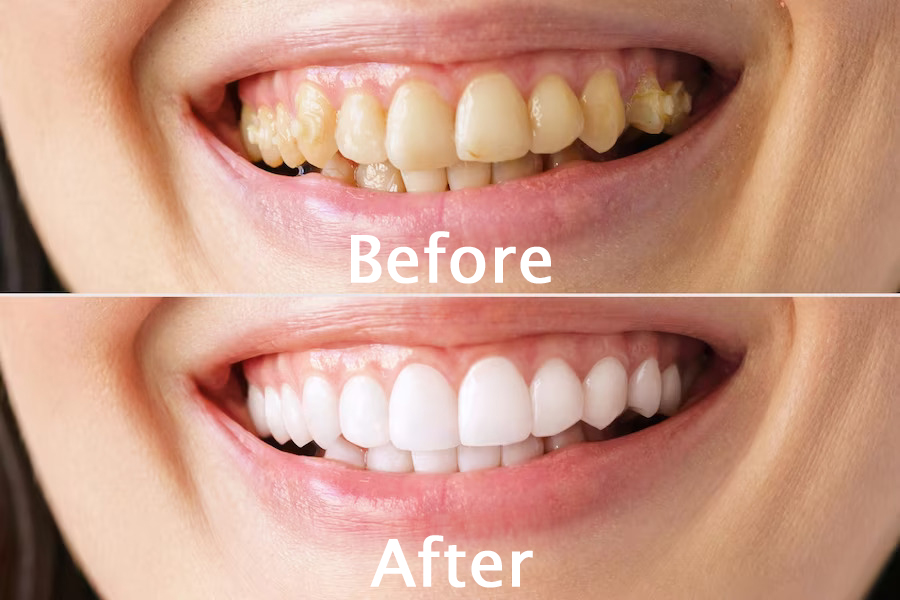Believe it or not, gum problems are the most common diseases affecting the human population. This is probably due to lack of regular professional teeth scaling. Most people think that teeth are the only element of a beautiful smile. However, the fact is that the size, shape, integrity, and health of gum tissue greatly influence the aesthetic appearance of even the most perfect teeth. Too much gum tissue can lead to teeth that look short and wide while too little gum tissue can lead to exposure of root surfaces of teeth that look way too long.
- Scaling and polishing is the periodic service needed for your teeth and gums.
- For long-term maintenance of teeth, it is, therefore, advisable to go in for professional cleaning once in six months even if you do not have an evident gum problem.
- The procedure involves cleaning all the surfaces of your teeth by a mechanical device called a scaler and through hand instrumentation. The procedure removes food particles, plaque, stains, and calculus accumulating around the tooth.
- After scaling, it is mandatory to get your teeth polished. Polishing smoothens the tooth surfaces made rough by deposits and at the same time adds a gloss to your smile. Polished tooth surfaces are less likely to retain plaque immediately compared to a rough surface.
Scaling and polishing may even be combined with teeth whitening to get a beautiful, white and flashy smile!
Scaling and Polishing of Teeth – Before & After


Scaling & Polishing FAQs
What is scaling and polishing?
The removal of tarter and calculus from around the teeth is called Scaling. It is like a service for your teeth and gum health and is recommended every 6 months.
Polishing is the rubbing of teeth with a polishing paste and a special brush to restore its shine and luster and to remove superficial stains from the surface.
How often should I have scaling and polishing done?
Ideal recommended frequency for scaling and polishing is 6 months.
Is scaling and polishing painful?
No, neither scaling nor polishing is painful. It can though cause sensitivity in few teeth.
Are there any side effects of scaling and polishing?
In teeth with gum recession or those with a lot of deposit, scaling sometime results in tooth sensitivity. This sensitivity can last up to weeks or even months depending on the severity of condition.
Can scaling and polishing damage my teeth?
Absolutely not. Scaling and polishing is like a routine maintenance service for your teeth and gums. On the other hand, not getting a scaling and polishing regularly can be bad for your oral health.
How can I maintain the results of scaling and polishing?
Regular and proper brushing twice a day can go a long way in maintaining the results of scaling and polishing but reducing the amount of food particles getting stuck in between teeth to a minimum.
Why do I need teeth scaling?
Your brushing efficiency can be 99.9% but not 100%. This means that some food particles keep accumulating around your teeth on a daily basis. Over a period of several months, these deposits can become sufficient enough to damage your teeth and gums. Regular removal of these deposits can therefore prevent tooth and gums damge.
How long does teeth scaling take?
It is not important how long does scaling take..important is how efficiently are food deposits and calculus removed during the procedure.
The duration of the procedure can vary depending on the amount and hardness of the deposits and how cooperative the patient is.
What is the disadvantage of scaling?
Scaling at times can cause tooth sensitivity particularly in teeth with gum recession or with heavy calculus deposits.
Can we brush teeth after scaling?
As such there is no need for brushing the after scaling as scaling itself cleans the teeth, but if you desire to brush, you can.
Do teeth go back to normal after scaling?
Since eating food is a daily process, so is the process of food getting stuck or accumulating between and around the teeth. So, it is not abnormal for deposits to return around your teeth after few weeks/months. That is why it is advised to go in for scaling every 6 months.
What is the price of scaling teeth?
The price for scaling can vary depending on the extent and severity of tooth deposits and the presence of tooth stains.
How is teeth scaling different from teeth polishing?
Scaling is the removal of food particle and calculus deposits around the teeth while polishing is the rubbing of teeth to restore its natural shine and luster.
Is teeth scaling covered by dental insurance?
While some dental insurance do pay for teeth scaling, others do not. Please check with your individual insurance provider to confirm the details.
Can I perform teeth scaling at home?
No, teeth scaling is a professional job needing a high degree of precision and skill and of course specific hand instruments and a dental scalar.
Doing it without s proper training and experience can damage your teeth and gums.
What can I expect after teeth scaling?
You feel some empty spaces between your teeth left by removal of food deposits. As such teeth feel clean, smooth and shiny.
Is teeth scaling necessary for everyone?
Yes teeth scaling is necessary for everyone who wants to maintain his/her gum and teeth health in the long run.
Can teeth scaling prevent gum disease?
Absolutely. Gum diseases begin with food getting stuck in between your teeth. If these deposits are removed regularly, they will not grow enough to start the progression of gum duseases.
To book an appointment for dental cleaning, Contact us today!
